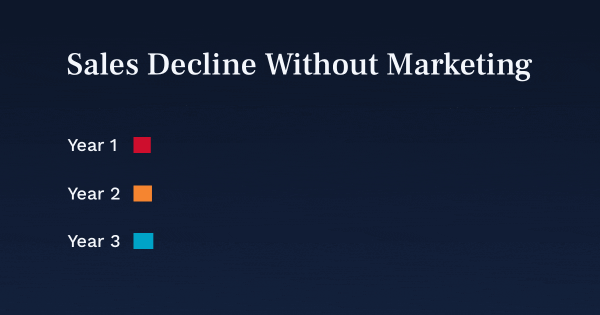You’ve been on your marketing game: communicating consistently, following up, executing with purpose.
And it’s working. New matters are coming in, and your team is at (or over) capacity for the foreseeable future.
You’re busy, so…you can stop marketing now, right?
Not so fast. (And we’re not just saying this because this is what we do.)
Statistics from academic research show marketing needs to be consistent, or awareness of your firm’s brand and the quality of services it provides will disappear.
A study by the Ehrenberg-Bass Institute for Marketing Science, titled “When Brands Go Dark,” found the following:
- When brands stop broad-reach advertising for a year or longer, most likely, sales will decline: 16 percent after one year without advertising, 25 percent after two years, and 36 percent after three years.
- Sales declined more rapidly for small brands that stopped marketing.
- Larger, growing brands often were observed to continue to grow after advertising stopped, but almost all smaller, growing brands immediately began to decline.
Even though this study refers to a stop in advertising spending, the effect on stopping marketing is the same: Awareness of your law firm, your attorneys, your services, your brand will decrease.
Being out of sight and out of mind is possible for even seemingly well-known brands. It once happened to an entire state after it decided to stop marketing.
In 1993, Colorado eliminated its $12 million tourism marketing budget. According to a presentation by the state’s former tourism marketing agency, Colorado’s domestic market share plunged 30 percent in two years after the cuts, representing a loss of over $1.4 billion in annual tourism revenue. And in the summer resort segment, Colorado dropped from first place among states to 17th.
Even aware of these facts, it may still be tempting to rationalize a pause, cut or elimination of marketing spend. Here are some common reasons law firms want to stop marketing:
We just paid for a new website. Can’t we just let that speak for itself?
A new website is an important tool for law firms and legal services companies to attract new business. It’s your virtual receptionist or waiting room, and the image it projects is designed to convince clients they should work with you.
Referrals are the top driver of business development for lawyers. But after a potential client receives a word-of-mouth recommendation, they will research who they’re working with. That’s when they’ll find your website.
But do you just want to show your potential clients new drapes and furniture? While you might have practice area descriptions, thought leadership articles, testimonials, and attorney biographies published on your website, are they updated? To make the best impression on potential clients, you’ll want to present the best evidence, just like in court.
When those potential clients search your firm’s name on Google or LinkedIn, will they find relevant articles about their legal issue in the top results? Not if you’ve stopped marketing. It’s only half the battle to project an image that your firm has experience. You need marketing to make the case that you continue to demonstrate authority and provide great service.
But what about a recession? Can I pause and pick up marketing later?
With predictions of a recession making headlines in the latter months of 2022, it may be tempting to temporarily cut back on marketing with the idea of picking it up down the road.
But an article by the Harvard Business Review calls cyclical marketing (increasing spend during the good times and cutting during the bad) “today’s equivalent of bleeding – an old-fashioned but once widespread treatment that actually reduces the patient’s ability to fight disease.” Companies that did not cut their marketing spend bounced back most strongly from previous recessions, according to a study by the International Journal of Research in Marketing.
We’ve already paid for content. Why do we need more?
The best attorneys are true subject-matter experts in their niches. Perhaps you’ve paid for content marketing, and your website features several articles that demonstrate your authority on specific areas of the law.
According to BTI Consulting, nearly 60 percent of law firm clients said they use online resources to compare their lawyers to the other side. If your competition is spending on marketing and publishing new content about your legal niche and you aren’t, how will you fare in this matchup?

